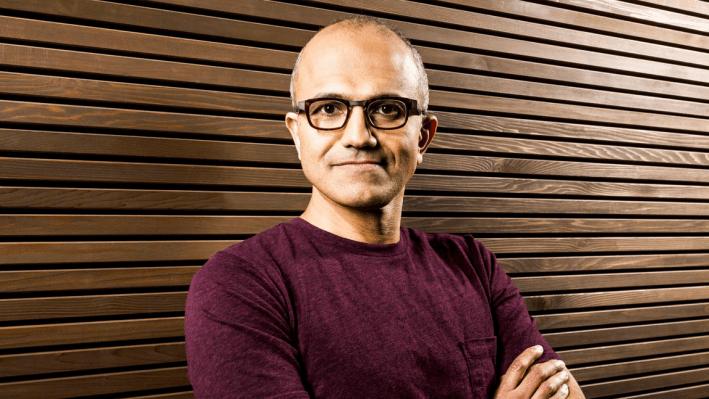After recently managing to stuff two feet into his mouth at the same time, Microsoft CEO Satya Nadella stopped by CNBC for a wide-ranging interview covering not only his recent comments on women in the workplace, but also his company’s bets on the cloud, and how Microsoft has long had an implicitly freemium business model.
Nadella, who has been CEO for around three-fourths of a year now, made waves at the Grace Hopper conference, when he intimated that women should not ask for raises. In his comments today, Nadella reiterated his retraction and apology.
Gender And Tech, A Reprise
The entire interview is mandatory reading, but here is the most salient riff on this topic [excisions for length: TechCrunch; Transcript: CNBC]:
But I was completely wrong in the answer I gave to the question that was asked around how should women promote themselves and make advances to their own careers. Because I basically took my own approach, to how I’ve approached my career and sprung it on half the humanity. And that was just insensitive. […] I just gave a very generic answer — based on, quite frankly, what I’ve believed and how I’ve practiced and lived my life — without thinking through, what if someone was faced with bias in their career?
How would they feel by sort of getting advice that says, ‘Be passive’? […] [I]n the face of bias, the last thing I want anyone is to be passive. If anything, both leaders like me need to take on responsibility to break down the barriers, break down the biases, create systems that are better functioning; and every individual faced with bias should also not be passive.
[…] And I just was, I would say a bit naive in thinking of my own personal experience versus understanding that I’m speaking to women who really, really want to make sure that people like me are making it easy for them to be able to participate in the workforce fully.
That’s a pretty comprehensive answer. Nadella notes that he answered from his own perspective, as someone for whom the system worked well — not taking into account the fact that others, those who face biases that he did not, might not be able to apply the same rubric and find similar success. As far as mea culpa goes, it seems sincere.
It’s not often you hear a CEO call her, or himself ‘naive’ on a topic, let alone on of this level of importance.
The Cloud
Nadella’s comments on the cloud were in line with his previous notes: Office 365 is doing well; Azure, matters; overall cloud revenue is growing, and so forth.
One specific paragraph, however, stood out:
Satya Nadella: I think that if you’re not already spending a lot of capital in the order of four or five billion dollars each year to just grow your cloud, probably it’s a little too late to enter the market. I mean, that’s the entry barrier, and there are a few of us who are in that mega-scale of cloud —
CNBC’s Jon Fortt: So that’s the cost of entry. If you’re not prepared to spend four or five billion dollars a year, forget it?
Satya Nadella: I mean, that’s the rate at which — it’s the same thing. I mean, if you’re a network operator today, you have to be in that business, and if you’re a mega-scale cloud provider you’re already committing a lot of capital.
This is a pretty interesting side of the cloud and platform wars: The need for simply tectonic quantities of liquid capital to compete. I think that we are seeing the further divergence of cloud companies that provide storage-based solutions, and cloud companies that sell both storage and compute services — Dropbox and Box can’t afford to spend billions per year on global compute infrastructure, but they can be competitive on price when it comes to storage itself. Or, at least they can for now — let’s not get too ahead of ourselves.
Nadella named Amazon and Google as two other companies that are investing similar amounts of capital into building a global datacenter network of scale. Apple is a notable exclusion from that list — its cloud projects are a topic all their own, of course.
Later today, Microsoft is hosting a cloud-focused event in San Francisco. Presumably, the company will have fresh news.
How Microsoft Went Freemium
Wrapping on a lighter note, Nadella joked that Microsoft has nearly always had a freemium business model. If that doesn’t sound quite right, read the following:
Satya Nadella: […] We want to have you use us when you just want to save any file or any document, any artifact of yours. And then have a natural way for us to monetize as you use more of it in the commercial context.
CNBC’s Jon Fortt: Kind of the freemium model, which a lot of startups in Silicon Valley latched onto. But Microsoft has always been fond of getting paid for the software it spent so much time and money developing.
Satya Nadella: Well, we’ve always had freemium. Sometimes our freemium was called piracy.
The business sense to the company’s new, explicit freemium strategy is that it has the potential to drive recurring revenue for the company, unlike pirated copies of Windows that remain popular in a host of countries.
Put another way, Microsoft is willing to give out OneDrive storage, Office Online and Windows upgrades, provided that a decent-sized chunk of people sign up for more, paid storage, buy Office 365, and still pick up new PCs that help drive Windows Store incomes.
The Microsoft cloud event kicks off at 11 a.m. Pacific time. Strap in.
Top Image Credit: Microsoft
